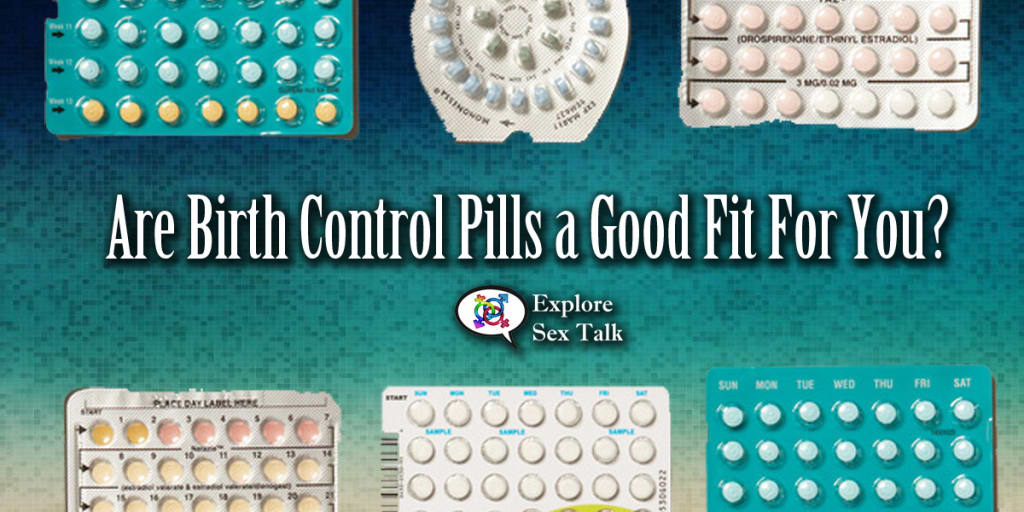Are Birth Control Pills a Good Fit for You?
What kinds are there?

Birth control pills are a form of contraception that involve the use of hormones. The pills can vary in their make up but the majority of brands are a combination pill of different hormones such as estrogen and progesterone. They come in a pack and one is taken every day until the pack is empty.
How Do Birth Control Pills Work?
The pill helps prevent pregnancy in a number of different ways. The hormones released by the pill thicken the mucus on the cervix. With a thicker mucus, it makes it very difficult for sperm to pass through and swim to an egg.
The pill also stops ovulation while it's being taken. This means that no egg is released to be fertilized by any sperm that get through.
The hormones released by the pill can also, in some cases, affect the lining of the uterine wall, making it very difficult for a fertilized egg to attach and develop into a fetus.
What Kind of Birth Control Pill Options Are There?
Along with different brands to choose from, there are also a few different kinds of regiments to choose from. The different options basically provide some choice for maintaining the habit of taking the bill daily or how long to delay menstruation.
Some birth control pills are packaged for 21 days. The person will then take one pill every day until the pills for the month are used. Then, after 7 days, a new pack is started.
There is also the 28-day pack. This has the same 21 pills that contain the hormones but also has 7 pills that contain no hormones. This is an aid for those who need the daily habit to take the pill.
Another choice is to reduce the frequency in which menstruation happens. A combination pill is available that provides the hormones for 12 weeks and then the inactive pills for 7 days. This reduces periods to one every three months.
Lastly, there are also "Mini-pills" which only contain progestin and no estrogen. These pills only change the thickness of the mucus and lining of the uterus, they do not prevent an egg from being released. It is crucial that these pills are taken at the same time every day, as their effectiveness drops considerably.
How Effective is the Birth Control Pill?
The birth control pill, when used perfectly, is 99% effective. Research has revealed that approximately 9 out of every 100 people who take it get pregnant. This places its real-world effectiveness at about 91%.
So what makes birth control less effective?
Sometimes people can forget to take a pill or they may be sick. Vomiting or diarrhea can reduce the effectiveness of the pill because the body may not absorb all the hormones. A person's weight may also be a factor as the pills are not adjusted to take body mass into account.
There are also some medications that can reduce the effectiveness of most birth control pills such as
- The antibiotic Rifampin
- The antifungal Griseofulvin
- Certain HIV medications
- The herb St. John's Wort
Other medications may also interfere with the effectiveness of birth control so if you are using the pill, be sure to discuss that with your doctor whenever a new medication is prescribed.
How Does Someone Use the Pill Effectively?
When a person is starting birth control for the first month, it's important to note that it can take up to 7 days for it to become effective. It's recommended to still use an alternate form of birth control in the first week.
All forms of the birth control pill work best when they are taken at the same time every day. To help you remember, you can set an alarm on your phone or download a birth control reminder app. If you have a friend who is also taking the pill, you can agree to help each other remember every day. You can also ask your partner to remind you.
It can be a good idea to keep your pills with you in a bag or purse or place them somewhere you will see them at roughly the same time each day. If you have a set routine and have to be up and out by a certain time, maybe leave them in the bathroom next to your toothbrush.
Does The Pill Protect Against STIs?
Not even a little! The pill can be pretty magical but it definitely will not protect you against any sexually transmitted infections.
If STIs are a concern, consider using condoms/barriers every time during sex. This has another added benefit that condoms can also prevent against an unwanted pregnancy so it can be a great way to add to your pregnancy prevention.
What Are the Other Benefits of Using the Pill?
Aside from preventing pregnancies, there are some other benefits that go along with taking the pill. Some other potential benefits include making periods more regular and lighter. The hormones can also reduce menstrual cramps and protect against pelvic inflammatory disease.
Combination birth control pills can also reduce, or protect against:
- Headaches and premenstrual depression
- Cysts in the ovaries or breasts
- Iron deficiency
- Acne
- Bone thinning
- Ectopic pregnancy
- Serious infections in the ovaries, uterus, and tubes
- Ovarian and endometrial cancers
- Non-cancerous breasts growths
Is the Birth Control Pill Safe?
Many people have safely and successfully used the birth control pill. That doesn't mean that is a perfect fit for everybody.
Some common side-effects in the first few months of using the pill can include nausea, vomiting, breast tenderness, and bleeding between periods. Another common side effect reported is that people can experience a change in their sex drive.
Smoking and birth control pills aren't always a good mix. It isn't recommended for anyone over 35 that smokes to use any birth control pill that contains estrogen.
Also, anyone who has, or has had, any of these conditions should be exploring other birth control methods as they could be at risk of
- Blood clots, vein inflammation, or inherited blood-clotting disorder
- Breast cancer
- Diabetes or liver disease
- Uncontrolled high blood pressure
- Migraine headaches with an aura
- Heart attack, angina, stroke, or other serious heart conditions
Anyone taking the pill who experiences any of these warning signs should be contacting their health care professional immediately:
- Soreness in the legs
- Yellowing in the eyes and skin
- Pain in chest and/or abdomen
- Trouble breathing
- Sudden development of a bad headache where an aura includes flashing zigzag lines and/or bright lights
What Brand Names of the Pill Are Available?
There are many different brands available for the pill. Which one will work best for you will depend. Some brands do work better for certain people over others. This is something you can discuss with your health care provider.
Cost can be another factor. Depending on where you live, your medical coverage may or may not cover the costs of certain brands. The costs can range up for roughly $50/month. This is another factor you can discuss with your doctor when selecting what might be a good fit.
The current combination brands include:
- Alesse
- Apri
- Aviane
- Enpresse
- Levlite
- Levora
- Loestrin
- Lutera
- Mircette
- Ortho-Novum 777
- Ortho Tri-Cyclen
- Seasonale
- Seasonique
- Sprintec
- Taytulla
- Yasmin
- Yaz
Some of the progestin-only birth control brands include:
- Camila
- Errin
- Heather
- Jolivette
- Nor-Q.D.
- Nora-Be
- Ortho-Micronor
Taking Charge of Your Health
Choosing the right birth control method for you and your partner may take time. Learning about all the different options may seem daunting but it will be one of the best ways to help determine what will be a good fit. In the case of hormonal birth control, sometimes trying different brands is the ticket to find what works best. It's good to be informed but also to have a good health care provider you can be open and honest with.
Enjoyed this article? Check out the other great articles, games, and more on my website.
About the Creator
Teela Hudak
Teela is a Vancouver-based Sex Educator & Relationship Expert. Learn more at: https://exploresextalk.com/






Comments
There are no comments for this story
Be the first to respond and start the conversation.